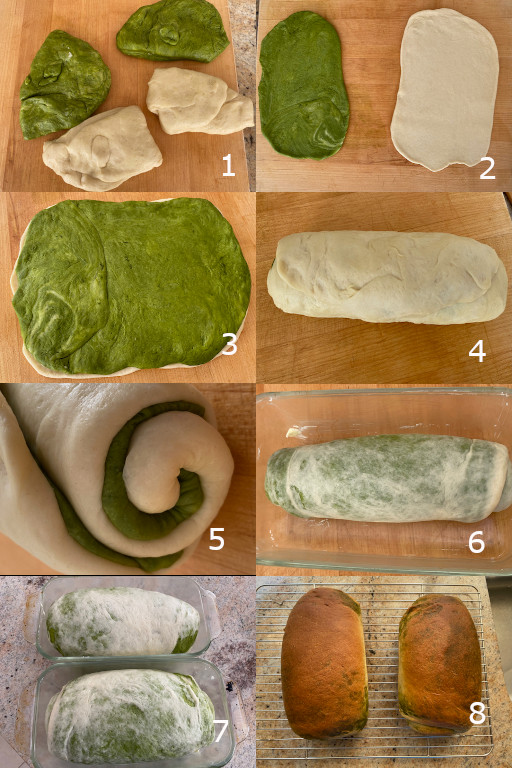My wife saw this recipe on the King Arthur’s website and as part of her project to try every type of Japanese milk bread (shoku-pan 食パン) she could find (as witnessed in the number of milk bread recipes in this blog), she decided we had to make this. Who could pass up a Japanese milk bread with swirls of matcha green tea in it? The original recipe called for a single loaf made with three equal portions placed in the baking loaf pan. My wife decided to just make 2 separate loaves. Rolling the dough to make the different colored swirls was a bit tricky, and required some teamwork. But the end result, with nice concentric swirls (below), looked better than the pictures of the original 3 part loaf. Visually stunning, we can taste the green tea (quite a good amount of matcha 抹茶 green tea powder went in).
Ingredients
Tangzhong 湯種
1 cup (227g) milk, whole preferred
1/2 cup (60g) AP flour
Dough
1/2 cup (113g) milk, whole preferred; cold*
2 1/2 teaspoons instant yeast
2 tablespoons (25g) granulated sugar
1 large egg
3 1/2 cups (420g) AP Flour
2 teaspoons salt
4 tablespoons (57g) unsalted butter, softened, plus more for greasing pan
2 tablespoons (12g) matcha powder
1 tablespoon (14g) water
*Cold milk will help cool down the tangzhong and bring the dough to a slightly warm temperature.
Directions:
To make the tangzhong: In a small saucepan, whisk together the milk and flour. Cook the mixture over medium heat, whisking constantly, until a thick paste forms and the whisk leaves lines on the bottom of the pan, about 4 to 6 minutes. Transfer to the bowl of a stand mixer.
To make the dough: Using a whisk or the whisk attachment of the mixer, add the milk, yeast, sugar, and egg into the tangzhong and whisk until fully combined.
Add the flour and salt to the mixing bowl and use the dough hook attachment to knead on low speed until a shaggy, cohesive dough forms, about 1 minute.
With the mixer still on low speed, add the butter about one tablespoon at a time, waiting to add the next piece until the previous one is fully incorporated, about 3 to 4 minutes total. Increase the speed to medium-high and continue to mix until a smooth, elastic, and tacky (but not sticky) dough forms and pulls away from the sides of the bowl, 7 to 10 minutes.
On a lightly floured surface, divide the dough in half. Knead one half briefly, form into a tight ball, place in a greased bowl, and cover.
Transfer the remaining half of the dough back to the bowl of the stand mixer and add the matcha tea and enough water to get the tea incorporated into the dough. Knead, beginning on low speed and working up to medium, until fully incorporated, about 1 to 2 minutes. (Don’t worry about any remaining small clumps of matcha; they won’t appear in the finished loaf.) Transfer the matcha dough to the lightly floured work surface, knead briefly, round into a tight ball, place in greased bowl, and cover.
Let the dough rise at a warm room temperature until doubled in volume, about 45 minutes to 1 hour.
To shape the loaf: Turn the matcha dough onto a lightly floured work surface and divide it into 2 equal portions and set aside. Repeat with the plain dough (#1). Let the dough rounds rest, covered, for 15 minutes to make the dough more pliable and easier to work with.
Use a lightly floured rolling pin to roll out one portion of plain dough into an oval. Repeat with a portion of matcha dough (#2). Stack the matcha dough on top of the regular dough, then lightly press with the rolling pin to cohere. It should measure 11” X 8”. (#3). Starting on the short end, roll up the dough into a tight cylinder (#4). Cover and set aside while you repeat the process with the remaining portions of dough. You should end up with two cylinders, each made up of two kinds of dough.
Arrange one cylinder on your work surface so that the short end is facing you, then use a rolling pin to flatten it into a 12” x 8” rectangle. The plain dough will be covering the matcha dough entirely, but you will see a flattened green and white spiral at both ends (#5). Starting with the shorter end, roll up the dough into a tight log (#6). Place the log, seam side down, into a buttered 8 1/2” x 4 1/2" loaf pan. Repeat with the remaining dough and put it seam side down in the second loaf pan (#7).
Cover the pan and set it in a warm place. Let the dough rise until it looks puffy, springs back slowly when gently pressed; about 30 to 40 minutes. Towards the end of the rising time, preheat the oven to 350°F. Bake for 40 to 45 minutes, or until the crust is golden brown and the interior of the loaf registers at least 190°F when measured with a digital thermometer (#8).
Remove the loaf from the oven and turn onto a wire rack to cool for at least 30 minutes before slicing.

.jpeg)

ABSOLUTELY GORGEOUS!!
ReplyDelete